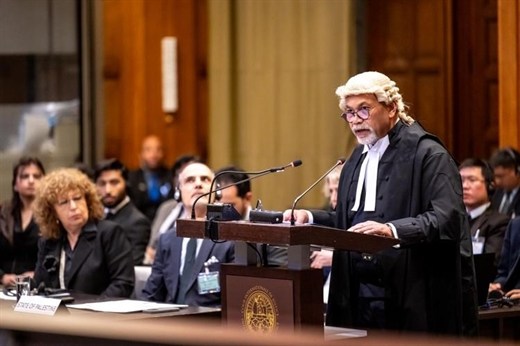Media Release: Nauru Calls for Legal Clarity on Climate Obligations at the ICJ
REPUBLIC OF NAURU
Department of Foreign Affairs &
Trade
For Immediate Release
Tuesday, 31 December 2024
Media Release: Nauru Calls for
Legal Clarity on Climate Obligations at the ICJ
The Hague, Netherlands, December
10, 2024- The Republic of Nauru presented its case before the
International Court of Justice (ICJ), calling for legal clarity on
states' obligations under international law to address the global
climate crisis.
Represented by Minister for Foreign
Affairs & Trade Hon. Lionel Rouwen Aingimea and Legal Counsel
Mr. Eirik Bjorge, Nauru emphasised the existential threats that
climate change poses to small island developing states (SIDS),
particularly in relation to their sovereignty, territorial
integrity, and the fundamental human right to
self-determination.

Nauru's submission to the ICJ
focuses on principles of general international law, asserting that
states have binding obligations to prevent environmental harm,
ensure the rights of other states are respected, and uphold the
international legal order. Nauru specifically highlighted the
following legal points:
- Obligation to Prevent Transboundary Harm:
Nauru invoked the principle
established in theCorfu Channelcase, which mandates that states
must not allow their territory to be used in ways that cause harm
to other states. This principle applies universally, including in
the context of climate change. Nauru argued that states
contributing significantly to greenhouse gas emissions are
violating this principle by causing transboundary harm that
disproportionately affects SIDS.
As Nauru emphasised,"No state
should have the right to inflict harm on others, especially when
that harm threatens the survival of nations and the rights of
future generations."
- Due Diligence Standards:
Nauru emphasised that international
law requires states to exercise stringent due diligence in
mitigating environmental harm. Drawing on precedents such as
theNuclear Weapons Advisory Opinionand theCOSIS Advisory Opinion,
Nauru argued that major emitters must take all necessary measures
to prevent harm caused by their emissions, including complying with
scientific recommendations on emission reductions.
- Protection of Sovereignty and Territorial Integrity:
Rising sea levels caused by climate
change threaten Nauru's territorial integrity and sovereignty, core
principles under international law. In the words of Nauru's
submission, "Rising sea levels pose severe threats that violate our
right to sovereignty, to territorial integrity, and the right of
our people not to 'be deprived of its own means of
subsistence.'"
- Right to Self-Determination:
Nauru asserted that climate change
undermines the right to self-determination, enshrined in Article 1
of the International Covenants on Human Rights. By compromising the
habitability of Nauru's land and forcing the potential displacement
of its people, climate change infringes upon this fundamental
right. As Minister Aingimea noted, "Climate change is the single
most destructive threat to the security and to the well-being of
our population."
- Legal Obligations Beyond Treaties:
Nauru argued that obligations under
general international law are not superseded by treaty frameworks
like the Paris Agreement. Instead, these treaties complement
existing obligations. Nauru called on the ICJ to confirm that
states cannot evade their responsibilities under general
international law by relying solely on treaty mechanisms.
The ICJ proceedings, running from 2
to 13 December 2024,are the largest in the Court's history, with
oral submissions from a record 98 states and 12 intergovernmental
organisations.
These proceedings stem from United
Nations General Assembly Resolution 77/276,adopted on March 29,
2023, which requests the ICJ to address two pivotal questions:
- What are the obligations of states under international law to
ensure the protection of the climate system for present and future
generations?
- What are the legal consequences for states where their actions
or omissions have caused significant harm to the climate
system?
The resolution, championed by
Vanuatu and supported by other SIDS, underscores the
disproportionate burden of climate change on vulnerable nations.
Over 2024, the ICJ received 91 written submissions,the highest
number ever in advisory proceedings, which will inform the Court's
forthcoming opinion, expected in 2025.
Minister Aingimea reiterated
Nauru's call for justice and accountability, emphasising
international law principles such as state sovereignty, territorial
integrity, and the duty to prevent harm. Nauru urged the ICJ to use
this moment to set a legal precedent that safeguards vulnerable
states. As emphasised in the submission,"The ICJ has the
opportunity to reaffirm that the rule of law protects the weak
against the excesses of the powerful. Its guidance is critical for
a just and sustainable future."
The ICJ's advisory opinion,
expected in 2025, is anticipated to shape international climate
governance. It will provide legal guidance on states' obligations
under international law and outline the consequences of failing to
act. This decision is expected to set a transformative precedent,
reinforcing the legal framework for holding states accountable and
addressing the climate crisis through international law.
--ENDS-
For enquiries, please contact:
tkila.dfat@gmail.com
Foreign Service Division
Department of Foreign Affairs &
Trade
Republic of Nauru